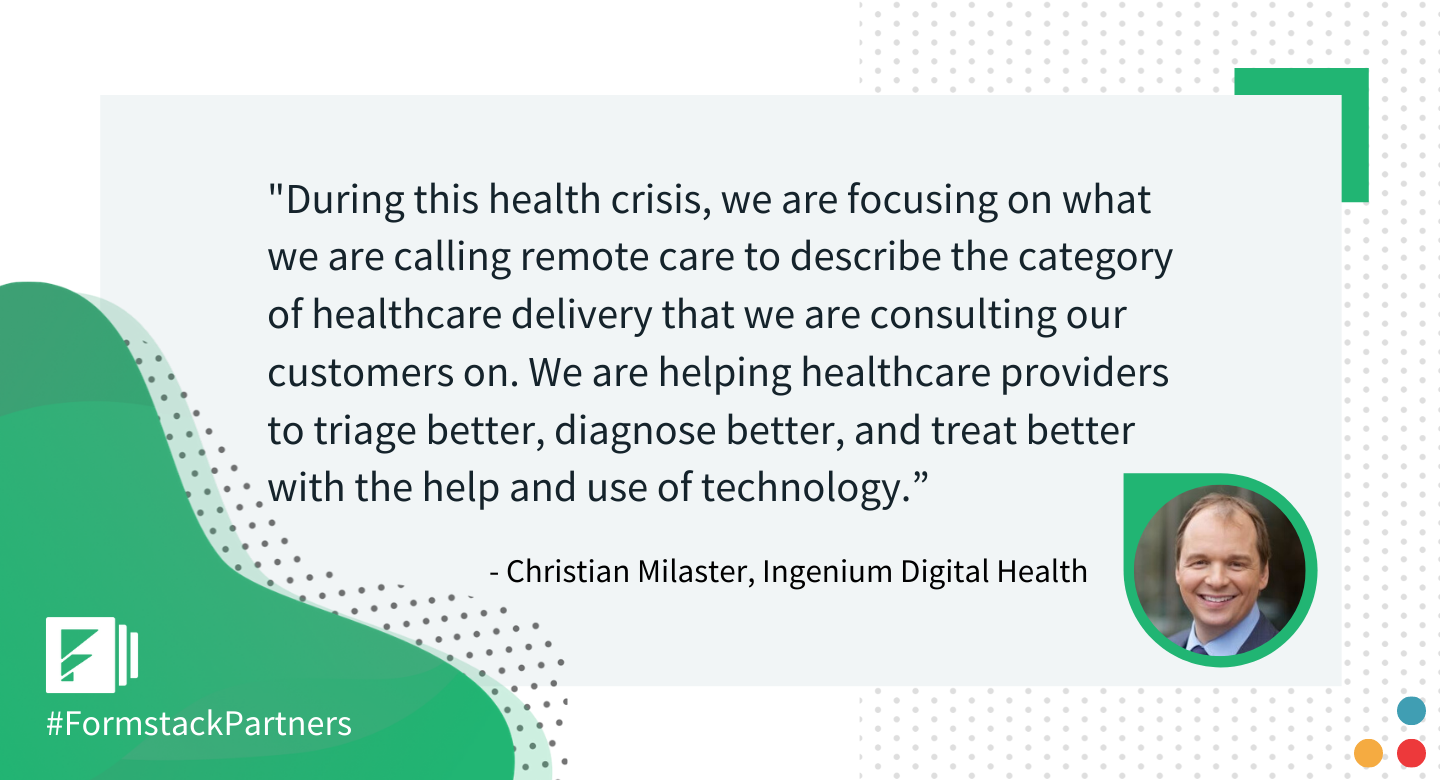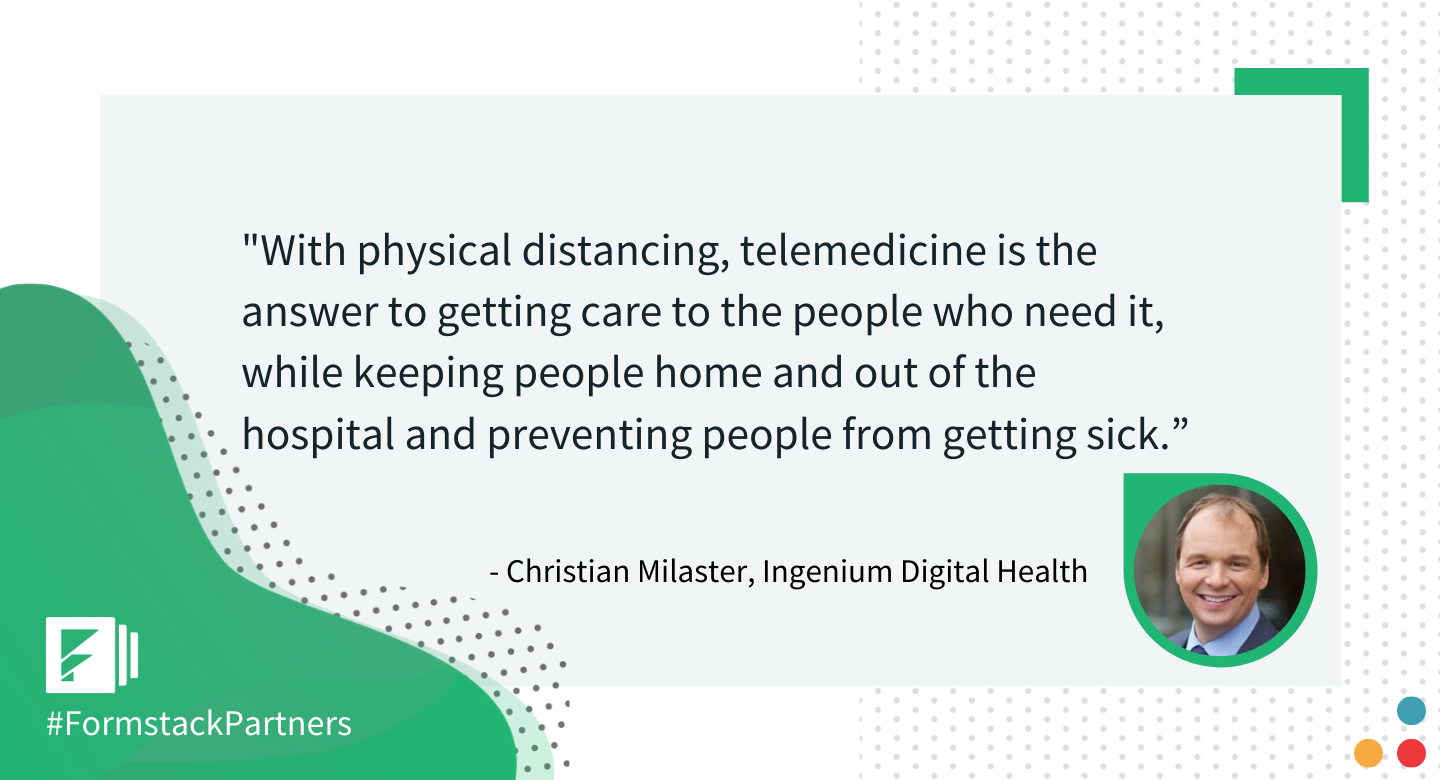Our VP of Partnerships Zak Pines recently sat down with Christian Milaster, Founder and President of Ingenium Digital Health, as part of our ongoing Partner Interview Series. Zak and Christian had a far-ranging conversation that covered Christian’s background in telehealth, the term he prefers instead of telehealth or telemedicine, the process for a virtual physician visit, and when he realized the massive impact COVID-19 would have on physicians.
Background on Ingenium Digital Health
Zak: This is a timely conversation since, due to the COVID-19 health crisis, many physician practices and healthcare providers are urgently looking to move their practices to a telehealth model. We at Formstack are hearing the term probably 1,000 times more than we did before the health crisis. We appreciate you joining us today so we can learn from you on this topic.
Christian: I’m looking forward to the discussion, Zak.
Zak: Let’s start with some background about you and your business. Can you tell us about your business, Ingenium Digital Health?
Christian: We focus on helping healthcare organizations, health systems, and physician practices improve delivery of care through the judicious use of technology. During this health crisis, we are focusing on what we are calling remote care to describe the category of healthcare delivery that we are consulting our customers on. We are helping healthcare providers to triage better, diagnose better, and treat better with the help and use of technology.

Zak: The hot term seems to be “telehealth.”
Christian: Yes, and back in 2012, I was virtually the only healthcare consultant focusing exclusively on telehealth.
Zak: How did you get into this field?
Christian: For the past 33 years, my career has been at the intersection of technology and service delivery, using process improvement and technology to improve the delivery of service. I entered the healthcare world in 2000 at the Mayo Clinic in Minnesota, working on a variety of projects around healthcare delivery and improving research.
Zak: How and why did you get started with telemedicine?
Christian: Back in 2003, I started working with three cardiologists at the Mayo Clinic. One of the cardiologists lost a parent to an unexpected arrhythmia because it was not detected. He had the insight that it could have been avoided if we had technology to continuously monitor heart rhythms. Over eight years, working with a variety of national and international business partners, we developed the technology that is now known as the BodyGuardian.
Then fast forward to 2012, I launchd Ingenium as a consulting business focused specifically on helping organizations to launch and grow telehealth services.
Zak: Where does the name come from?
Christian: Ingenium is the latin root for words like ingenuity and engineering. My German master’s degree title is “Diploma Ingenieur,” which is the french spelling of engineer. Since we are applying a dose of ingenuity mixed with engineering principles, the name fit well.
Zak: What are the key philosophies of your business?
Christian: I have a pinned tweet on my Twitter page. It’s one often used by Don Berwick, MD, the founder of the Institute of Healthcare Improvement (IHI). The quote is “Every system is perfectly designed to get the results it gets.”
It’s like a Yogi Berra quote. It’s profound to me because it reminds us that if you want to accomplish a different outcome—staff satisfaction, revenue, profitability, patient outcomes—you need to change the system. People only change themselves in response to the system.
Telehealth, Telemedicine, & Remote Care
Zak: I want to learn more from you in these areas. Can we talk through what exactly telemedicine entails?
Christian: Some people think telemedicine means you have a webcam and a Zoom subscription, and you are ready to go. But that is just one aspect of telemedicine.
Zak: You mentioned earlier you are not using the word telemedicine. Instead, you are referring to it as remote care.
Christian: That’s right. At the start of the COVID-19 health crisis, we realized what physician practices are setting up could not and should not live up to the standard of properly designed telemedicine services. Remote care is connecting with patients at a distance, which is what is really needed these days. But very quickly we need to go beyond connecting and move to practicing medicine at a distance, which is our definition of telemedicine.
The credit for that distinction goes to my colleague, Kathy Letendre, who coined that term. She’s a great organizational consultant based in Vermont. She equated the difference between telemedicine and remote care to the difference between distance education and remote teaching, which is what most K-12 teachers are doing now.
The definitions we are using are: telehealth is delivering care at a distance; telemedicine is practicing medicine at a distance; and remote care is connecting with patients at a distance.
Zak: Leading up to this point, traditionally, what challenges did you face with practices embracing the remote care model?
Christian: The three biggest hurdles I had before the crisis were what I call the three “I’s.” The first was ignorance; and what I mean by that is either they weren’t aware this was an option, or they didn’t think it was relevant to them. The second “i” is inertia; they realized there was a problem, but they didn’t get it off the ground because there was no push for it. They figured there would be too many challenges to get it right. And the third “i” is internal resources; they thought they could do it themselves but later found it would take them 6-18 months to roll out vs. weeks—or now I’m helping practices move to remote in 36 hours.
Zak: What is something that a physician maybe doesn’t realize needs to be factored into a remote care approach?
Chrisitan: A big one is that you need to be licensed where the patient is located because the state licensing laws still apply, even though the Centers for Medicare & Medicaid Services waived that requirement for reimbursement purposes.
Zak: COVID is forcing adoption for remote care and telemedicine. When did you realize you were in the eye of the storm with your experience and focus on this?
Christian: We knew COVID was incredibly serious when I spoke to a physician group COO and he said they had 197 cancellations of patient appointments that day. The next day the waiting room in one practice was completely empty at 9:30 a.m. on a Wednesday.
That’s when it became real to me. With physical distancing, telemedicine is the answer to getting care to the people who need it, while keeping people home and out of the hospital and preventing people from getting sick.

For that organization, I launched their telemedicine service for five rural primary care offices within 36 hours. We were at a meeting at 9:30 a.m. on Wednesday, and by Friday, we had set up training sessions to roll it out to the staff, growing the volume in five days to 400 visits a day—or about two-thirds of pre-COVID visits.
Process for a Virtual Physician Visit
Zak: What is the process a physician practice should be thinking about setting up as they move to remote care?
Christian: The first new step is when the patients are scheduling their appointment. During that scheduling, you need to set up a process to test their technology so that they are technically ready to go when they meet with the physician
Then, right before the visit, you still need some sort of check-in and rooming process—just like you would in person. You can’t just have them show up and join a Zoom meeting.
They need to go to your waiting room, which could be an online form to start their virtual visit. And then you need to perform the collection of vital signs and medical reconciliation and confirm the pharmacy.
You then need an explicit check mark that step is done.
Zak: I like that concept of a virtual waiting room to process the patient ahead of the visit—through a form, as you said. And then what happens after the visit?
Christian: I’m very keen on continuous iteration and improvement. I want to get feedback on the process. We can send out a satisfaction survey—a post-visit form that gets presented to the patient automatically.
And then there is also the post-meeting summary that you can look to automate. Including the summary of the appointment and notes.
Zak: That’s really good, and I can see nice tie-ins to how Formstack can help with our HIPAA compliant forms, document generation, and eSignature products.
Before we wrap up, what’s ahead for you? Where do you want to be one year from now?
Christian: I’m seeing an opportunity to transform the expertise of the 10 subject matter experts in digital health that I’ve been working with for five years into a digital health consultancy over the next six months. I’m planning on hiring and engaging a CEO to run the business, so I can focus on bringing our expertise powerfully to our clients, using our frameworks for remote care and telehealth.
A year from now, I’d like to have built the premier digital health consultancy that has helped hundreds of physician offices stand up telemedicine to prevent them from going out of business.
Lightning Round
Zak: What are some of your personal interests or hobbies?
Christian: My family, especially my daughters. And music—I play the keyboard, when I can make the time.
Zak: Can you share a productivity tip?
Christian: The best productivity tip is to know yourself. Know your own personality. I’m a big fan of “The 7 Habits of Highly Effective People.” First things first. Start with the end in mind. Be proactive. Those are the key ones.
Zak: What is your favorite TV show, past or present?
Christian: “Breaking Bad.” The novelty. The brilliance. Breaking the mold. Each episode has such a high caliber. Everything is very crisp.
Zak: What’s your go-to lunch during the workday?
Christian: I haven’t even had a meal today. When I get to do lunch, I go with three eggs and bacon.
Zak: Is a hot dog a sandwich?
Christian: Absolutely! It’s meat between two pieces of bread. Yes.
Looking for your next step? Check out Formstack’s partner program for consultants, agencies, and tech partners.











